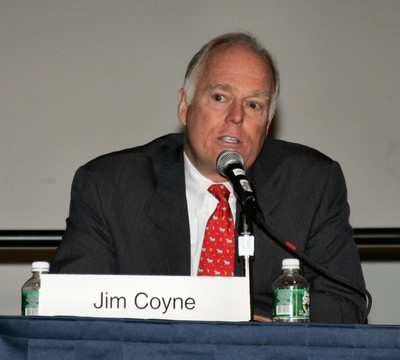Thu, Sep 23, 2010
James Coyne Testifies Before House Transportation
And Infrastructure Committee
 National Air Transportation Association (NATA) President James
K. Coyne testified Wednesday before the U.S. House of
Representatives Committee on Transportation and Infrastructure at a
hearing regarding Residential Through-the-Fence (RTTF) Agreements
at Public Airports. The FAA recently issued a proposed policy
regarding RTTF agreements at public airports. The policy would
subject existing RTTF agreements to closer oversight and prohibit
federally funded airports from entering into new RTTF
agreements.
National Air Transportation Association (NATA) President James
K. Coyne testified Wednesday before the U.S. House of
Representatives Committee on Transportation and Infrastructure at a
hearing regarding Residential Through-the-Fence (RTTF) Agreements
at Public Airports. The FAA recently issued a proposed policy
regarding RTTF agreements at public airports. The policy would
subject existing RTTF agreements to closer oversight and prohibit
federally funded airports from entering into new RTTF
agreements.
In his testimony, Coyne stated, "NATA agrees with the FAA that the
primary issue for not allowing new RTTF agreements is to ensure the
future utility of federally funded airports. Investments in
airports, made through the Airport Improvement Program or through
federal surplus property grants, are intended to enhance the
flexibility of airports to meet the future needs, in both capacity
and type of operations, of the National Airspace System. Due to the
intrinsic nature of residential properties, as compared to
commercial properties, RTTF agreements limit the flexibility of
airport sponsors to expand according to the needs of the community.
NATA believes that the FAA has made an overwhelming case for
prohibiting new RTTF agreements and supports its proposal."
Aviation Programs Manager for the Georgia Department of
Transportation Carol Comer also agreed with the FAA. "In the state
of Georgia, there are no RTTF agreements at any public-use
airport," explained Comer. "The state educates airport sponsors
that RTTF agreements are inconsistent with the airport's federal
obligation to ensure compatible land use adjacent to the airport
and reminds the sponsor that RTTF agreements may result in not
being able to receive any federal funding assistance due to
non-compliance with the airport's federal grant assurances."

File Photo
"Airport businesses, the majority of them small businesses,
invest billions of dollars in creating on-airport service
facilities that provide for the needs of the flying public," Coyne
stated. "Airport businesses are controlled by stringent oversight
by the airport sponsor to ensure their services support the needs
of the airport and the public. RTTF agreements reduce the future
purpose of the airport, which undermines the investment made by the
federal government and airport businesses."
Coyne concluded, "NATA believes that the FAA has proposed a
policy that well serves the long-term interests of public-use
airports, airport businesses and the public. Any attempt to
override that policy by statute could result in unintended
consequences that damage the future of the airport as well as the
future of all grant assurances."
More News
He Attempted To Restart The Engine Three Times. On The Third Restart Attempt, He Noticed That Flames Were Coming Out From The Right Wing Near The Fuel Cap Analysis: The pilot repor>[...]
Make Sure You NEVER Miss A New Story From Aero-News Network Do you ever feel like you never see posts from a certain person or page on Facebook or Instagram? Here’s how you c>[...]
From 2009 (YouTube Edition): Leading Air Show Performers Give Their Best Advice for Newcomers On December 6th through December 9th, the Paris Las Vegas Hotel hosted over 1,500 air >[...]
Aero Linx: NASA ASRS ASRS captures confidential reports, analyzes the resulting aviation safety data, and disseminates vital information to the aviation community. The ASRS is an i>[...]
“For our inaugural Pylon Racing Seminar in Roswell, we were thrilled to certify 60 pilots across our six closed-course pylon race classes. Not only did this year’s PRS >[...]
 NTSB Final Report: Rutan Long-EZ
NTSB Final Report: Rutan Long-EZ ANN FAQ: Turn On Post Notifications
ANN FAQ: Turn On Post Notifications Classic Aero-TV: ICAS Perspectives - Advice for New Air Show Performers
Classic Aero-TV: ICAS Perspectives - Advice for New Air Show Performers ANN's Daily Aero-Linx (06.28.25)
ANN's Daily Aero-Linx (06.28.25) Aero-News: Quote of the Day (06.28.25)
Aero-News: Quote of the Day (06.28.25)




